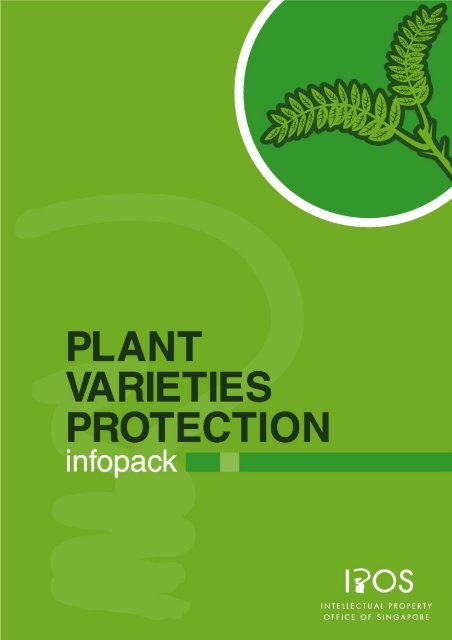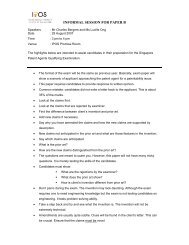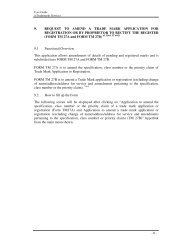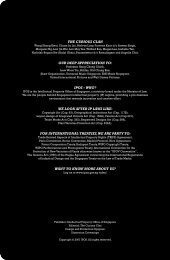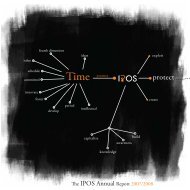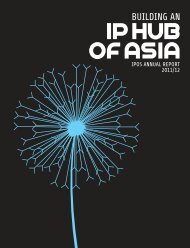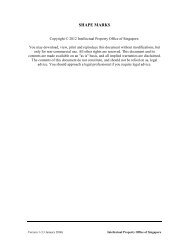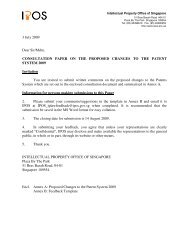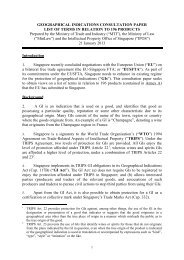Plant Varieties Protection Infopack - Intellectual Property Office of ...
Plant Varieties Protection Infopack - Intellectual Property Office of ...
Plant Varieties Protection Infopack - Intellectual Property Office of ...
- No tags were found...
Create successful ePaper yourself
Turn your PDF publications into a flip-book with our unique Google optimized e-Paper software.
Copyright © 2012 <strong>Intellectual</strong> <strong>Property</strong> <strong>Office</strong> <strong>of</strong> Singapore.You may download, view, print and reproduce this document without modifications, but only for non-commercialuse. All other rights are reserved. This document and its contents are made available on an "as is" basis, and allimplied warranties are disclaimed. The contents <strong>of</strong> this document do not constitute, and should not be relied onas, legal advice. You should approach a legal pr<strong>of</strong>essional if you require legal advice.
1 - INTRODUCTION AND FUNDAMENTALSA Breeder is a person who bred, or discovered and developed, the candidate plant variety. Any breeder,(an individual or a company) can apply for the grant <strong>of</strong> protection. However, if the plant variety is bred, ordiscovered and developed, in the course <strong>of</strong> work, under Singapore law, the rights to the plant variety maythen vest with the employer.The grant <strong>of</strong> protection can last for 25 years, subject to payment <strong>of</strong> annual fees. Annual fees are payableevery year starting from the end <strong>of</strong> the first year <strong>of</strong> grant. A grant <strong>of</strong> the plant variety protection is personalproperty and may be licensed or assigned in the same way as other personal property.Extension <strong>of</strong> <strong>Plant</strong> Variety <strong>Protection</strong>Under the plant variety protection system, protection is extended to• any plant variety which is essentially derived from the protected plant variety (referred to asthe “original plant variety”);• any plant variety which is not distinct from the original plant variety; and• any plant where the production <strong>of</strong> such plant variety requires the repeated use <strong>of</strong> the originalplant variety.A plant variety is “essentially derived” if• it is predominantly derived from the original plant variety or from a plant variety predominantlyderived from the original plant variety;• retains the expression <strong>of</strong> the essential characteristics that result from the genotype or acombination <strong>of</strong> the genotypes <strong>of</strong> the original plant variety except for the differences which resultfrom the act <strong>of</strong> derivation; and• it is clearly distinguishable from the original plant variety.Exclusions <strong>of</strong> <strong>Plant</strong> Variety <strong>Protection</strong>The rights conferred do not apply to acts done for• private and for non-commercial purposes;• for experimental or research purposes; or• for the purpose <strong>of</strong> breeding other varieties.Legislation Governing <strong>Plant</strong> Variety <strong>Protection</strong>The <strong>Plant</strong> <strong>Varieties</strong> <strong>Protection</strong> Act 2004 (”PVP Act”), together with its subsidiary legislation which consists<strong>of</strong> the <strong>Plant</strong> <strong>Varieties</strong> <strong>Protection</strong> Rules, form the legislation governing plant variety protection law inSingapore.>> View the PVP Act or the latest legislation update at the IPOS website www.ipos.gov.sg.>> Copies <strong>of</strong> the legislation are available at available at www.snpcorp.com/webshop or SNPCorporation Ltd at 1 Kim Seng Promenade, Great World City East Tower, #18-01/06 Singapore237994, Tel (65) 6826 9691.2
1 - INTRODUCTION AND FUNDAMENTALSUPOV Convention and National TreatmentThe PVP Act conforms to the 1991 revision <strong>of</strong> The International Convention for the <strong>Protection</strong> <strong>of</strong> New<strong>Varieties</strong> <strong>of</strong> <strong>Plant</strong>s (UPOV).Under the UPOV Convention, all member countries would accord equal treatment to all nationals andresidents <strong>of</strong> any other member countries <strong>of</strong> the Convention.Benefits <strong>of</strong> <strong>Plant</strong> Variety <strong>Protection</strong>By filing for plant variety protection, a breeder obtains a right to ownership and the right to prevent othersfrom using his rights to the protected plant variety without his authorisation.>> It is possible for a plant variety to be protected by both plant variety protection and patent as longas the requirements by each protection system are fulfilled.When to FileThe plant variety protection system in Singapore operates on a first-to-file basis. In other words, the firstperson to file for application will, in general, have priority over others.Priority Date ClaimSingapore, as a member <strong>of</strong> the UPOV Convention, allows priority claims in the application for the grant <strong>of</strong>protection. If an applicant has a corresponding application filed earlier in a UPOV Convention membercountry, he may claim priority from this first-filed application, provided the Singapore application is filedwithin 12 months from the date <strong>of</strong> the first filing. In such a case, where the application in Singapore is asubsequent application, the Registry <strong>of</strong> <strong>Plant</strong> <strong>Varieties</strong> will treat the date <strong>of</strong> application <strong>of</strong> the first filing asthe date <strong>of</strong> application in Singapore (known as priority date claim).<strong>Plant</strong> <strong>Varieties</strong> that can be ProtectedUnder the PVP Act, new varieties <strong>of</strong> the 15 plant genera and species listed in The Schedule (page 11) areeligible for protection. Brassica chinensis L. (commonly known as baicai) and Phalaenopsis Blume (aspecies <strong>of</strong> orchid) are 2 <strong>of</strong> the 15 plant genera and species listed.The candidate plant variety must meet the following criteria:• novelty;• distinctness;• uniformity; and• stability.It must also be given a suitable denomination.3
1 - INTRODUCTION AND FUNDAMENTALSNoveltyDistinctnessUniformityThe variety has not been sold or disposed <strong>of</strong>, by or with the consent <strong>of</strong> the breederi) earlier than 1 year before the date <strong>of</strong> application in Singapore where thesale or disposal is made in Singapore; andii)where the sale or disposal is made outside <strong>of</strong> Singapore, earlier than 6 yearsbefore the date <strong>of</strong> application in the case <strong>of</strong> trees or vines, or earlier than 4years before the date <strong>of</strong> application in the case <strong>of</strong> other plant varieties.The variety is clearly distinguishable from any other variety whose existence is amatter <strong>of</strong> common knowledge at the time <strong>of</strong> filing <strong>of</strong> the application. A variety thatis <strong>of</strong> common knowledge does not have to be a protected variety.The variety is sufficiently uniform in its relevant characteristics, subject to thevariation that may be expected from the particular features <strong>of</strong> its propagation.StabilityThe relevant characteristics <strong>of</strong> the variety remain unchanged after repeatedpropagation or, in the case <strong>of</strong> a particular cycle <strong>of</strong> propagation, at the end <strong>of</strong> eachsuch cycle.>> The distinctness, uniformity and stability (DUS) criteria are <strong>of</strong>ten grouped and examined together,and referred to as the "DUS Test”. The candidate variety will undergo a DUS Test conducted duringthe technical examination to ensure conformance.DenominationA denomination is the distinguishing name or identification for the plant variety.The breeder <strong>of</strong> the new variety has to propose a suitable denomination as its genericdesignation for approval. An example, “Summer Snow” is a denomination underRosa in a particular UPOV Convention member country.>> To conduct a search on the denominations in the UPOV Register, any member <strong>of</strong> the public mayaccess the records at the IPOS Public Search Room.4
1 - INTRODUCTION AND FUNDAMENTALSThe proposed denomination has to conform to all the criteria set out in Section 36 and 37 <strong>of</strong> the PVP Act.The following are instances where a denomination would not be acceptable.Denomination with numbers onlyThe proposed denomination should notconsist solely <strong>of</strong> numbers unless it is anestablished practice for designating plantvarieties.Misleading or confusing denominationThe proposed denomination must enable thevariety to be identified and not mislead orcause confusion concerning the characteristics,value or identity <strong>of</strong> the plant variety, or the identity<strong>of</strong> the breeder.Denomination contrary to public policy or moralityThe proposed denomination will not beapproved if it is to any written law or publicpolicy, or is likely to be <strong>of</strong>fensive to thepublic.Denomination confused with trade markThe proposed denomination would not besuitable if it is likely to cause confusion• with a trade mark, a name, a business or any other rights for which any person other than theapplicant enjoys protection under any law; or• with a trade mark for any material <strong>of</strong> another plant variety, or for goods similar to any material <strong>of</strong> thefirst-mentioned plant variety for which the applicant enjoys protection under any law.>> If an application in a UPOV Convention country has been previously made for the plant variety, thesame denomination has to be used when applying for the grant <strong>of</strong> plant variety protection inSingapore.If the Registrar deems a proposed denomination unsuitable for registration, the applicant would berequired to propose another denomination within the prescribed period.5
2 OWNERSHIP AND RIGHTSEntitlement to <strong>Plant</strong> Variety <strong>Protection</strong>Any breeder (an individual or a company) can apply for the grant <strong>of</strong> plant variety protection. However, ifthe plant variety is bred, or discovered and developed, in the course <strong>of</strong> work, under Singapore law, therights to the plant variety may then vest with the employer.There are no restrictions or discrimination as to nationality or residency. However, an applicant who isnot a resident in Singapore must provide the Registry <strong>of</strong> <strong>Plant</strong> <strong>Varieties</strong> with an address for service inSingapore to which all correspondences will be sent.Term and MaintenanceThe term <strong>of</strong> protection is 25 years from the date <strong>of</strong> grant, subject to the payment <strong>of</strong> annual fees. Annualfees are payable every year starting from the end <strong>of</strong> the first year <strong>of</strong> grant.Provisional <strong>Protection</strong>The owner <strong>of</strong> the protected plant variety is entitled to provisional protection and is able to take legalproceedings in respect <strong>of</strong> the plant variety for infringement activities that took place between the date <strong>of</strong>publication <strong>of</strong> the application and date <strong>of</strong> grant. However, such legal proceedings should commence onlyafter the plant variety protection has been granted.InfringementThe rights <strong>of</strong> the owner <strong>of</strong> the protected plant variety are infringed if a party performs any act described inthe Scope <strong>of</strong> Grant <strong>of</strong> <strong>Protection</strong> (page 1) without the consent <strong>of</strong> the owner in respect <strong>of</strong> the propagatingmaterial and/or harvested material <strong>of</strong> the plant variety.EnforcementThe owner <strong>of</strong> the protected plant variety can take civil legal action against an infringing party, seek reliefin the form <strong>of</strong> an injunction to stop the infringing activities, demand for the pr<strong>of</strong>its gained by the infringingparty at his expense or seek damages for the loss suffered.False RepresentationIt is a criminal <strong>of</strong>fence to falsely represent a plant variety as protected when it is not.6
3 APPLICATION PROCESSFiling an ApplicationThe applicant must file the application form, technical questionnaire, and necessary supportingdocuments together with the prescribed fee, at the Registry <strong>of</strong> <strong>Plant</strong> <strong>Varieties</strong> at IPOS. The application willbe administered by IPOS and the technical examination will be conducted locally by the Agri-FoodVeterinary Authority <strong>of</strong> Singapore (AVA).>> Propagating material <strong>of</strong> the candidate plant variety is not required upon submission <strong>of</strong> theapplication. The applicant will be notified in due course to provide the material <strong>of</strong> the plant varietyfor the technical examination.Priority ClaimIf an applicant wishes to claim priority, the declaration <strong>of</strong> priority has to be made at the point <strong>of</strong> filing theapplication. The priority documents and translations (if applicable) must be furnished within theprescribed period.Address for ServiceAn address for service in Singapore must be provided in an application for the grant <strong>of</strong> the plant varietyprotection. This is the address to which all correspondences from the Registry <strong>of</strong> <strong>Plant</strong> <strong>Varieties</strong> will besent. Where there is a change in the address for service, the applicant will have to notify the Registry <strong>of</strong><strong>Plant</strong> <strong>Varieties</strong>.Forms and FeesA list <strong>of</strong> the forms and fees pertaining to plant variety protection is enclosed at the back <strong>of</strong> this infopack.All forms are available at the Registry <strong>of</strong> <strong>Plant</strong> <strong>Varieties</strong> and are downloadable from the IPOS website,www.ipos.gov.sg.Application SubmissionThe application may be submitted in person to the Registry or mailed to the address below:Address:Registrar <strong>of</strong> <strong>Plant</strong> <strong>Varieties</strong>Registry <strong>of</strong> <strong>Plant</strong> <strong>Varieties</strong><strong>Intellectual</strong> <strong>Property</strong> <strong>Office</strong> <strong>of</strong> Singapore51 Bras Basah Road#04-01 Plaza By The ParkSingapore 1895547
3 - APPLICATION PROCESSRegistry’s operating hours : Monday to Friday: 8:30am to 5:30pmSaturday: ClosedCashier's operating hours : Monday to Friday: 8:30am to 5:00pmSaturday: ClosedCustomer Enquiry Hotline : (65) 6339 8616Fax : (65) 6339 0252Email: ipos_enquiry@ipos.gov.sgPayment can be made by NETS, cashcard, GIRO, cheque (crossed), money order and bank draft (inSingapore dollars) made out to <strong>Intellectual</strong> <strong>Property</strong> <strong>Office</strong> <strong>of</strong> Singapore.For submission by mail, the application form must be completed and duly signed together with all therequired documents and a cheque/money order/bank draft/request for GIRO payment.Process After SubmissionSubmission <strong>of</strong> ApplicationDate <strong>of</strong> FilingRegistry issues an acknowledgment letterwith the reference number and date <strong>of</strong>application.Preliminary ExaminationFormalities and proposed denominationchecks.PublicationInformation about application and proposeddenomination will be published in the <strong>Plant</strong><strong>Varieties</strong> <strong>Protection</strong> Journal, which may beaccessed by any member <strong>of</strong> the public. Anyparty may object to the application within 2months <strong>of</strong> publication.Technical ExaminationDUS test conducted by the AVAGrant / RejectPublication <strong>of</strong> Grant / RejectionCertificate <strong>of</strong> grant is sent to the applicantwhere application is accepted. If theapplication is rejected, a notification will besent to the applicant.Registrar publishes decision in the <strong>Plant</strong><strong>Varieties</strong> <strong>Protection</strong> Journal, which may beaccessed by any member <strong>of</strong> the public.8
3 - APPLICATION PROCESSDate <strong>of</strong> FilingOnce a completed application form is filed together with the technical questionnaire and the prescribedfee, it will be assigned a number and a filing date.Preliminary ExaminationAfter the applicant has filed all the necessary documents, the Registry <strong>of</strong> <strong>Plant</strong> <strong>Varieties</strong> examines thedocuments to ensure that the formalities have been met and checks the proposed denomination.PublicationThe application will be published in the <strong>Plant</strong> <strong>Varieties</strong> <strong>Protection</strong> Journal, produced by the Registry <strong>of</strong><strong>Plant</strong> <strong>Varieties</strong> once the preliminary examination is completed.>> The <strong>Plant</strong> <strong>Varieties</strong> <strong>Protection</strong> Journal is an online publication accessible on the IPOS websitewww.ipos.gov.sg.ObjectionAny member <strong>of</strong> the public or any interested third party may object to the grant <strong>of</strong> protection by filing aNotice <strong>of</strong> Objection at the Registry within 2 months from the date <strong>of</strong> publication. The party who objectsor the “objector” may object to the denomination or object on the ground that the plant variety did notmeet the required novelty criterion.Technical ExaminationIf the objection to the grant is resolved in favour <strong>of</strong> the applicant, or if there is no objection, the Registrywould notify the applicant that the application is in order and invite him to submit a request for technicalexamination.The AVA may require the breeder to furnish all the necessary information, documents and propagatingmaterial <strong>of</strong> the candidate plant variety within the prescribed period. During the examination, theexaminer would:a) verify whether the candidate variety belongs to the stated botanical taxon;b) establish whether the candidate variety is distinct, uniform and stable; andc) establish an <strong>of</strong>ficial description <strong>of</strong> the variety after (a) and (b) have been met.For the purpose <strong>of</strong> the DUS test, the AVA may consider the following:• information provided by the applicant in the technical questionnaire;• technical protocol under the UPOV guidelines;• the results from the growing tests (this may be carried out in cooperation with the applicant);and/or• DUS test reports by other examination authorities.Upon completion, the outcome <strong>of</strong> the examination will be documented in a report which will be sent tothe Registrar.>> If a variety has been granted protection in another UPOV Convention member country, it ispossible to rely on the examination report <strong>of</strong> that country for the purposes <strong>of</strong> the examination inSingapore. However, IPOS and the AVA have the right to reject these reports where they are notrelevant or not applicable, and request for the plant to be submitted for local testing.9
3 - APPLICATION PROCESSGrant <strong>of</strong> <strong>Plant</strong> Variety <strong>Protection</strong>The Registrar will decide whether to grant or reject the application based on the outcome <strong>of</strong> thetechnical examination.Post GrantTermThe term <strong>of</strong> protection is 25 years from the date <strong>of</strong> grant, subject to the payment <strong>of</strong> annual fees. Annualfees are payable every year starting from the end <strong>of</strong> the first year <strong>of</strong> grant.Provisional <strong>Protection</strong>The owner <strong>of</strong> the protected plant variety is entitled to provisional protection and is able to take legalproceedings in respect <strong>of</strong> the plant variety for infringement activities that took place between the date<strong>of</strong> publication <strong>of</strong> the application and date <strong>of</strong> grant. However, such legal proceedings should commenceonly after the plant variety protection has been granted.InvalidationAny party may apply to the Court to challenge the validity <strong>of</strong> the grant <strong>of</strong> protection on the groundsthat:• the plant variety was not novel and distinct at the time <strong>of</strong> grant;• the plant variety was not uniform or stable at the time <strong>of</strong> the grant and was essentially basedupon information provided by the breeder; or• the protection has been granted to a party who is not entitled to the grant.Any party may also apply to the Court to challenge the validity <strong>of</strong> a registered denomination on theground that it did not meet the required registration criteria.CancellationAny party may apply to cancel the grant <strong>of</strong> protection on specific grounds such as the plant variety isno longer stable or uniform.Filing for <strong>Plant</strong> Variety <strong>Protection</strong> Outside Singapore<strong>Protection</strong> for plant varieties is territorial in nature. To obtain protection outside Singapore, it isnecessary to file separate applications in the countries concerned.As Singapore is a member country <strong>of</strong> the UPOV Convention, breeders who are nationals and residents <strong>of</strong>Singapore would be accorded national treatment in any member country <strong>of</strong> the UPOV Convention.10
List <strong>of</strong> Genera and Species - The ScheduleBotanical NameCommon Name1. Orchids Dendrobium Sw. DendrobiumMokaraMokaraOncidium Sw.OncidiumVanda R. BrVandaArandaArandaArantheraArantheraPhalaenopsis BlumePhalaenopsisRenantandaRenantanda(2) Aquatic2. Aquaticplantsplantsand Ornamentalsand Ornamentals Anubias AnubiasCrytocoryneCrytocoryneCrytocoryneCrytocoryneEchinodorusSword <strong>Plant</strong>EchinodorusLimnophillaSword Limnophilla <strong>Plant</strong>LimnophillaHeliconiaLimnophillaHeliconiaHeliconiaHeliconia3. Vegetables Brassica Chinesis L. Baicai, XiaobiacaiBrassica Chinesis var parachinesisCaixin11
Frequently Used TermsBreederDenominationA Breeder is a person who bred, or discovered and developed the candidateplant variety.The distinguishing name or identification for the plant variety.DistinctnessThe variety is clearly distinguishable from any other variety whose existence is amatter <strong>of</strong> common knowledge at the time <strong>of</strong> filing <strong>of</strong> the application. The varietydoes not have to be a protected variety.NoveltyThe variety has not been sold or disposed <strong>of</strong>, by or with the consent <strong>of</strong> thebreederi) earlier than 1 year before the date <strong>of</strong> application in Singapore where the sale or disposal is madein Singapore; andii)where the sale or disposal is made outside <strong>of</strong> Singapore, earlier than 6 years before the date <strong>of</strong>application in the case <strong>of</strong> trees or vines, or earlier than 4 years before the date <strong>of</strong> application in thecase <strong>of</strong> other plant varieties.Priority Date Claim<strong>Plant</strong> VarietyAn earlier date which the applicant in Singapore may claim if there is acorresponding filing in a UPOV Convention member country; provided that theSingapore application is filed within 12 months from date <strong>of</strong> the earlier filing.A plant group within a single botanical taxon <strong>of</strong> the lowest rank.StabilityUniformityThe relevant characteristics <strong>of</strong> the variety remain unchanged after repeatedpropagation or, in the case <strong>of</strong> a particular cycle <strong>of</strong> propagation, at the end <strong>of</strong>each such cycle.The variety is sufficiently uniform in its relevant characteristics, subject to thevariation that may be expected from the particular features <strong>of</strong> its propagation.12
The <strong>Intellectual</strong> <strong>Property</strong> <strong>Office</strong> <strong>of</strong> Singapore or IPOS(http://www.ipos.gov.sg) is the lead governmentagency that formulates and regulates intellectualproperty (IP) laws, promotes IP awareness andprovides the infrastructure to facilitate the greaterdevelopment <strong>of</strong> IP in Singapore. With IP fastbecoming a critical resource in today's neweconomy, IPOS' vision is to foster a creativeSingapore where ideas and intellectual efforts arevalued, developed and exploited. Formerly known asthe Registry <strong>of</strong> Trade Marks and Patents, IPOS wasestablished as a statutory board <strong>of</strong> the Ministry <strong>of</strong>Law on 1 April 2001.
51 Bras Basah Road#04-01 Manulife CentreSingapore 189554Customer Enquiry Hotline • (65) 6339 8616Fax • (65) 6339 0252Email • ipos_enquiry@ipos.gov.sgWebsite • www.ipos.gov.sg


